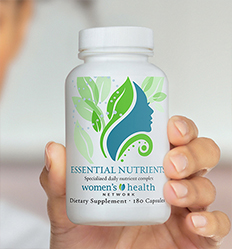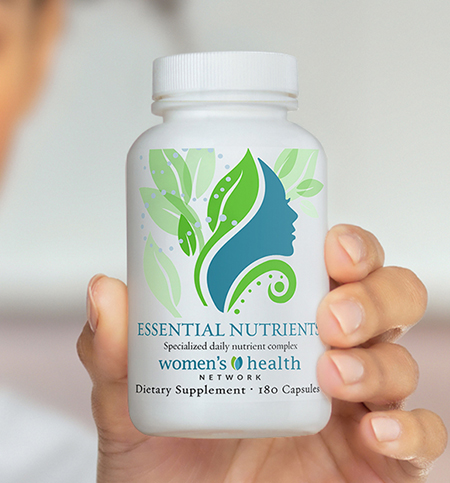Authored by Caroline Morin, NBC-HWC
For a long time, I thought multivitamins were unnecessary. I ate a balanced diet full of whole foods with plenty of fruits and veggies. I thought I was good. At the same time, I was experiencing a lot of anxiety, was getting hot flashes for the first time and was constantly struggling with allergies, symptoms that seemed to be common among women I talked to, something we all just sort of dealt with.
But the more I learned about nutrition, about the ways our bodies interact with our food and our environment, the more curious I became. Was there something I was missing?
So I asked my medical provider for a nutrient panel test, and the results were shocking to us both.
In a perfect world, yes, our diets would supply all the nutrients our bodies need. But modern life is far from perfect. Chronic stress, environmental toxins that are everywhere, and the demands of daily life put an enormous strain on our bodies, draining us of essential vitamins and minerals. The truth is, most of us are running on empty without even realizing it.
And modern stress levels and an ever increasing amount of environmental toxins mean a generic multivitamin won’t cut it.
In this article I’ll help you understand how to choose a high-quality multivitamin that supports stress management, detoxification and your real health needs.
Why modern life demands more from your multivitamin
Chronic stress: the nutrient thief
Stress isn’t just mental — it’s a full-body experience. When we’re under chronic stress, and most of us are (myself included) our body enters a state of heightened alertness, prioritizing survival over long-term health. This process burns through vitamins and minerals at an accelerated rate. Think of it like running your car engine at full throttle all the time; it’s going to burn more fuel, faster.
There are a few nutrients that are particularly impacted by chronic stress:
- B-complex vitamins – These vitamins are necessary for energy production, brain health and balancing mood. Stress depletes them quickly, leaving you feeling drained and more prone to anxiety.
- Vitamin C – Known for its immune-boosting properties, Vitamin C also plays a vital role in repairing tissues and protecting cells from damage. Chronic stress reduces your reserves, weakening your defenses.
- Magnesium – Often referred to as the “relaxation mineral,” magnesium helps regulate the nervous system. When stress levels are high, magnesium is rapidly depleted, contributing to tension, poor sleep and fatigue.
- Zinc – Essential for immune function, hormone balance and cellular repair, zinc levels drop when you’re chronically stressed, increasing vulnerability to infections and slowing recovery.
Detoxification: fuel for your body’s cleanup crew
Your body is constantly working to neutralize and eliminate toxins — pesticides, air pollutants, chemicals in your water supply, cleaning products, medication and even our clothing! Without adequate support of antioxidants and specific vitamins and minerals, your body simply can’t keep up.
Look for these key players to support everyday environmental stressors:
- Glutathione – Often called the “master antioxidant,” glutathione neutralizes free radicals and helps detoxify harmful substances in the liver.
- Vitamin C and Vitamin E – Both are powerful antioxidants that help reduce oxidative stress and protect cells from damage.
- Selenium – This trace mineral supports glutathione production and aids in the detox process, particularly in the liver.
- Plant compounds – Nutrients found in foods like cruciferous vegetables (broccoli, kale, Brussels sprouts) enhance the body’s detox pathways.
What to look for in a good multivitamin
I used to grab my multivitamins from the grocery store or order whatever was easy on Amazon. Then I learned that unlike pharmaceuticals, supplements do not require approval from the FDA before hitting the market.
This results in the fact that some multivitamins do not contain the ingredients listed on the label or provide them in the amounts advertised. Others may include substances that are not bioavailable — meaning your body can’t fully absorb or use them.
Many popular multivitamins use the cheapest, least bioavailable forms of nutrients. For example, Centrum and its counterparts often use synthetic folic acid, which must be converted by your body into its active form — methylfolate — before it can be used. For many people, especially those with the MTHFR gene mutation which studies suggest could be up to 40% of the population, this conversion is inefficient, leading to unabsorbed nutrients.
Many generics only include the bare minimum required to avoid deficiency. Generic brands frequently include unnecessary fillers, binders, artificial colors and preservatives. These additives do nothing for your health and, in some cases, may even contribute to inflammation or digestive discomfort.
Even more concerning, some formulas may harbor harmful ingredients like pesticides, preservatives, or even heavy metals.
This is why it’s absolutely critical to look for supplements that have been independently tested to meet specific quality standards. Many generics do not. This lack of transparency makes it difficult to trust what’s inside the bottle.
Fortunately, Women’s Health Network supplements are manufactured in an NSF and GMP-registered facility, providing an extra level of protection by testing each production batch to ensure it matches label specifications.
Their formulas are designed for optimal bioavailability and are free of toxins, hormone disruptors, artificial preservatives and synthetic dyes. This is the kind of quality assurance you should expect from any multivitamin you choose.
A few more points to consider:
- Avoid “too good to be true” claims: If a product promises to diagnose, treat, prevent or cure any disease, look out!
- Be an informed consumer: Read the labels and make decisions based on your needs, not because some influencer or even your best friend claims it’s the next best thing!
- Include your healthcare provider: Always let your healthcare provider know about any supplements you are taking, especially if you are on medications or managing a health condition.
Making the shift to quality
If your goal is to genuinely support your health, investing in a high-quality multivitamin matters. Look for brands that prioritize bioavailability, third-party testing and effective dosages. Your body deserves nutrients that actually make a difference.









